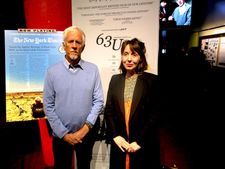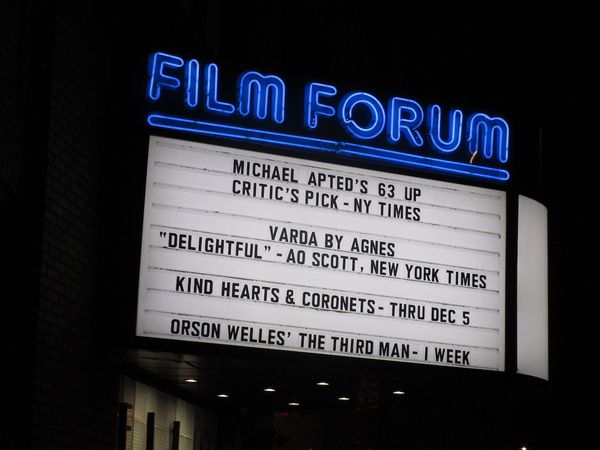 |
| Michael Apted’s 63 Up and Agnès Varda’s Varda By Agnès on the Film Forum marquee over Thanksgiving Photo: Anne-Katrin Titze |
On the occasion of the US theatrical première of 63 Up at Film Forum in New York, Michael Apted participated in three post-screening Q&As. The director who has been involved with the Up series of documentaries from the start, beginning with seven-year-olds, has continued on doggedly through 7 Plus Seven, 21 Up, 28 Up, 35 Up, 42 Up, 49 Up, 56 Up, and also found time to make feature films in-between, which include Gorillas In The Mist, Coal Miner's Daughter, Enigma, Extreme Measures, Amazing Grace, and his take on James Bond, starring Pierce Brosnan in The World Is Not Enough.
Just last month Michael Apted was honoured along with Martin Scorsese with a Visionaries Tribute Lifetime Achievement Award at the tenth anniversary of DOC NYC. Michael also received the Critics Choice Documentary Landmark Award for the Up series of TV documentaries.
Following the SOLD OUT 6:20pm screening of 63 Up on Friday night, before an audience that included what looked like seven-year-olds seated in the front row, I started out by asking Michael where we all will be in 2026, anticipating 70 Up.
Anne-Katrin Titze: I suppose not many people in this room have an appointment for 2026, let alone 12 of those. So how much did making this film series really structure your life?
Michael Apted: Oh my God. I don't know. It's a good question. I haven't had this one before. And I've been at it a bit. I was the same kind of kid we have in here. This is very difficult. I was very sympathetic to the film from the very beginning. I sort of understood what it was going to be and how it could work.
I was asked to do it when I was only 22, working for a television company in Manchester. I was working with a Canadian [Paul Almond] who was a very good visual director but he had no idea about the class system.
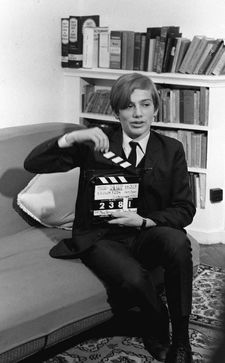 |
| John at 14 in 63 Up |
In some ways it was my kind of voice that was guiding it through the first one. Then Granada decided after five years - they didn't exactly hurry - to do another one. Then it became a bit clearer for me where this could go.
AKT: After 14 it was clear that you wanted to do it?
MA: I wanted to do it as soon as I knew what it was. Something I learned about from my mother, in my mother's womb. She was a housewife with three children but she was very very interested in social things. It was in my mother's milk, this kind of stuff.
AKT: Did your mother watch them, did she get to see the programs?
MA: Yes, she did. I don't know where she got up to when she passed away. She certainly saw up to five or six of them, I think.
AKT: A film came out last week, A Beautiful Day In The Neighborhood, where Tom Hanks as Mister Rogers is reminding someone - and us all - that we were all little ones and that we were all once seven years old - some still are in the front row [that night at Film Forum]. I think your film does something similar, something that connects us all. It's a good reminder, especially now.
MA: Where did they get this from? Shall I have a word with Mr. Hanks? And ask him to send money?
AKT: You always include the seven-year-olds, every seven years. It's at the core still, and goes back to that Jesuit saying.
MA: Yeah, but we didn't know what we were doing when we started it out. We knew there was tremendous problems in England, in Great Britain, about social class. Then slowly things began to change and in many ways this film was one of the things that did change it.
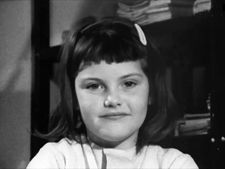 |
| Sue at 7 - 63 Up |
This was the time to make the film; the timing was breathtaking. We were lucky all the way through. We didn't decide to make the second one until five years after we finished the first one.
AKT: Jackie in this one [63 Up] attacks you a little bit by saying that you have some kind of gender bias with your questions. Is that accurate?
MA: I think it's true. Women were treated badly, unless you were rich and white kind of stuff. Generally, women had bad luck before people began to realise the importance of women and the ability of women. England was a very male-orientated culture.
A lot of women didn't have a lot of opportunity to advance, be famous and be rich. There was a deep misbalance between the way women were treated and I was in that sort of mess. But my mother was very feminist. I think she set this in my brain. She was a very smart woman, my father never made really enough money for her to have any kind of independent life. She was very aggressive about politics.
The whole business of men and women and fairer opportunities became real eventually but it took forever. This series probably had a little hand in it because you could see as it went on, how unfair British society was and how ashamed we should be. It sort of came to light a bit with this film.
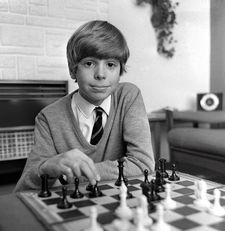 |
| Neil at 14 - 63 Up |
AKT: There is nothing like it anywhere in the world, really.
MA: We lucked out really. We didn't deserve our own luck.
AKT: You did! We did! We're all profiting from this.
MA: I think so. What we thought was a British problem, a European problem, everywhere you want to go, there it was. In some way it was part of the findings that women had of what was their rights and how badly they were treated …
The first assembly only had four girls in it and ten men. And we were stuck with that. We had to get it more even as the series went on. They got married and then I used the wives.
AKT: Are you planning to go to the zoo with them for 70 Up?
MA: Okay, fair enough.
AKT: [SPOILER ALERT] You include the death of Lynn in the middle of the segment on her, not at the beginning. So it comes to us as a big surprise while we're watching. Could you talk a little about this decision?
MA: Well, I mean, you know, it's a double thing. I've got to make a film that will have a grip on an audience, that isn't boring. So there are certain devices in documentaries that you can use.
Usually it's the trick of withholding information from the audience. So, oh my God, something happens. You do it in any piece of drama, you don't just lay it all out and say thanks very much, good night. You've got to keep an audience on its toes.
 |
| 63 Up with Michael Apted and Anne-Katrin Titze SOLD OUT! on the opening weekend at Film Forum in New York Photo: Anne-Katrin Titze |
AKT: In this case, for the ones following her segment, I was thinking, is she the only one who died? It changes how we see the ones after her. And I think it'll change for the next one, too. We know your trick now.
MA [with a grin]: Are you going to write a nasty article about it?
AKT: Sure! I would never do that.
MA: Doesn't sound like it!
Read what Michael Apted had to say on growing up, Wild Strawberries, Coronation Street, Paul Almond, and getting to 63 Up
Read what Michael Apted had to say on the evolution of his multiple award-winning Up series of documentaries, the importance of Denis Forman at Granada TV, being on a “tightrope” with the participants over the years, going into Virginia Woolf territory, and why seven is a “magical number.”
16 days of 63 Up at Film Forum in New York runs through Thursday, December 12.








